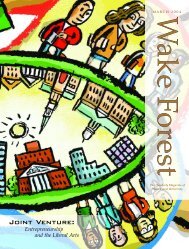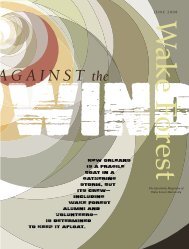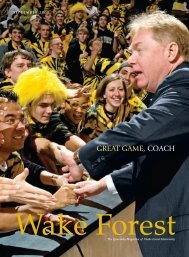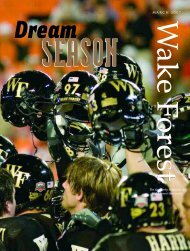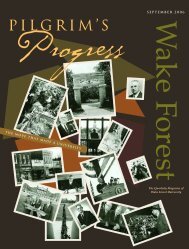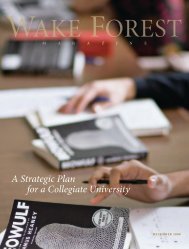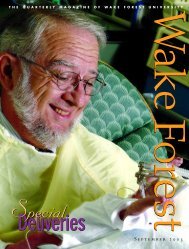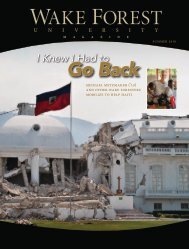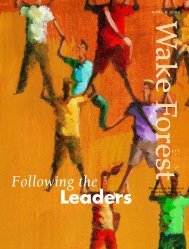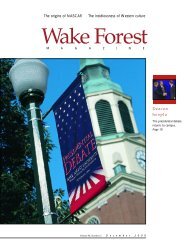Wake Forest Magazine, December 2004 - Past Issues - Wake Forest ...
Wake Forest Magazine, December 2004 - Past Issues - Wake Forest ...
Wake Forest Magazine, December 2004 - Past Issues - Wake Forest ...
Create successful ePaper yourself
Turn your PDF publications into a flip-book with our unique Google optimized e-Paper software.
World War II made the children,<br />
then young adults, far more American<br />
than Italian. They had macaroni.<br />
They had the Catholic church. But<br />
they had no connection whatsoever<br />
to their cousins in Calabria, just<br />
one generation removed.<br />
I always figured this was just the<br />
way of things. Either my elders weren’t<br />
storytellers, or it simply wasn’t important<br />
to know about our not-sodistant<br />
Italian heritage. The reality<br />
is that my immigrant grandparents<br />
never romanticized their homeland.<br />
It wasn’t romantic; it was brutally<br />
difficult. And neither the prime<br />
ministers in Rome nor the popes in<br />
the Vatican cared enough about<br />
southern Italy to slow the tide of<br />
those leaving. During the great U.S.<br />
migration between 1880 and 1920,<br />
some thirty million southern Italians<br />
left their homes, representing an<br />
astonishing 83 percent of all Italian<br />
immigrants. America, not Italy, offered<br />
salvation and hope. They were grateful<br />
and they didn’t look back.<br />
Then a funny thing happened<br />
in 1997. Word flitted across the<br />
Atlantic to my family that a Catanoso<br />
had been beatified by the pope in<br />
a huge ceremony at the Vatican.<br />
A near saint in the family tree? My<br />
goodness. How did this happen?<br />
But more to the point, how could<br />
we not know about him?<br />
The train ride from Rome to<br />
Reggio Calabria took six hours.<br />
We were uncertain of what to<br />
expect. I had been in contact with<br />
a Catanoso cousin by e-mail in<br />
the months prior to our trip. We’re<br />
coming, I told her, my wife and<br />
three daughters and me. But given<br />
the Italian nonchalance toward confirming<br />
plans, I couldn’t assure my<br />
three kids that there would be anyone<br />
waiting at the train station.<br />
As we got off on the platform The din never fell below a roar,<br />
with our bags, I looked around. with some English spoken, but<br />
Other passengers were instantly mostly Italian. We learned that<br />
greeted, but not us. I quickly this was a typical Sunday lunch at<br />
calmed myself. I had phone num- Pina’s—food, family and revelry.<br />
bers and addresses written down. Only on this day, five more seats<br />
We’d take a cab to the hotel and— were wedged around two long<br />
just then an older woman less than tables in the dining room.<br />
5-feet-tall ambled up to me.<br />
As the women cleared the plates<br />
“Catanoso?” she asked, beauti- and brought in a wave of fruits<br />
fully enunciating every syllable. and desserts, I could feel a film-<br />
Yes.<br />
maker’s hand at work again. My<br />
“Pina Catanoso,” she said, before wife is a musician and singer; a<br />
reaching out with soft hands to kiss few of my cousins knew this.<br />
me on both cheeks.<br />
Soon, one of them emerged with<br />
We were the first Catanosos a beat-up guitar held aloft. He<br />
from America to set foot in Reggio presented it to Laurelyn like a<br />
Calabria in more than thirty years. scepter as the room erupted with<br />
Of course they would meet us. accented chants of “country music,<br />
Three more cousins appeared, country music!” She and I exchanged<br />
as if from the mist. I could barely glances as if to say, ‘Can you believe<br />
see them through the tears in all this?’ As I snapped pictures and<br />
my eyes.<br />
Laurelyn began to sing, I noticed<br />
When we arrived at Pina’s apart- my daughters falling comfortably<br />
ment for lunch, the place was into the embrace of this lovely<br />
jammed. I couldn’t<br />
family, our family.<br />
shake the thought<br />
It was clear to<br />
that someone was<br />
me that there was<br />
scripting every<br />
no poverty in that<br />
moment. More<br />
room. Whatever<br />
than twenty-five<br />
suffering and depri-<br />
people awaited<br />
vations Pina and<br />
us, three genera-<br />
her parents endured<br />
tions, all clapping<br />
years ago, her<br />
and cheering,<br />
children, and their<br />
all Catanosos.<br />
cousins—my peers—<br />
Everything felt<br />
are happily middle<br />
familiar; everybody<br />
class with nice clothes,<br />
looked familiar.<br />
And the food could<br />
Gaetano Catanoso<br />
cell phones, and professional<br />
jobs. They<br />
have been straight<br />
are all also close rela-<br />
from my mother’s kitchen—grilled tives of Father Gaetano Catanoso,<br />
eggplant slices in olive oil, peppers whose presence is still felt in this<br />
and eggs, macaroni in tomato sauce, home. When Pina was a young<br />
macaroni with tuna and olive oil, woman, her cousin was her priest,<br />
sliced pork, spicy sausages, baked the man she entrusted with her<br />
fish, all enjoyed with homemade confessions. Surely he was a part of<br />
red wine.<br />
these Sunday meals a generation ago.<br />
E S S A Y<br />
DECEMBER <strong>2004</strong> 23



